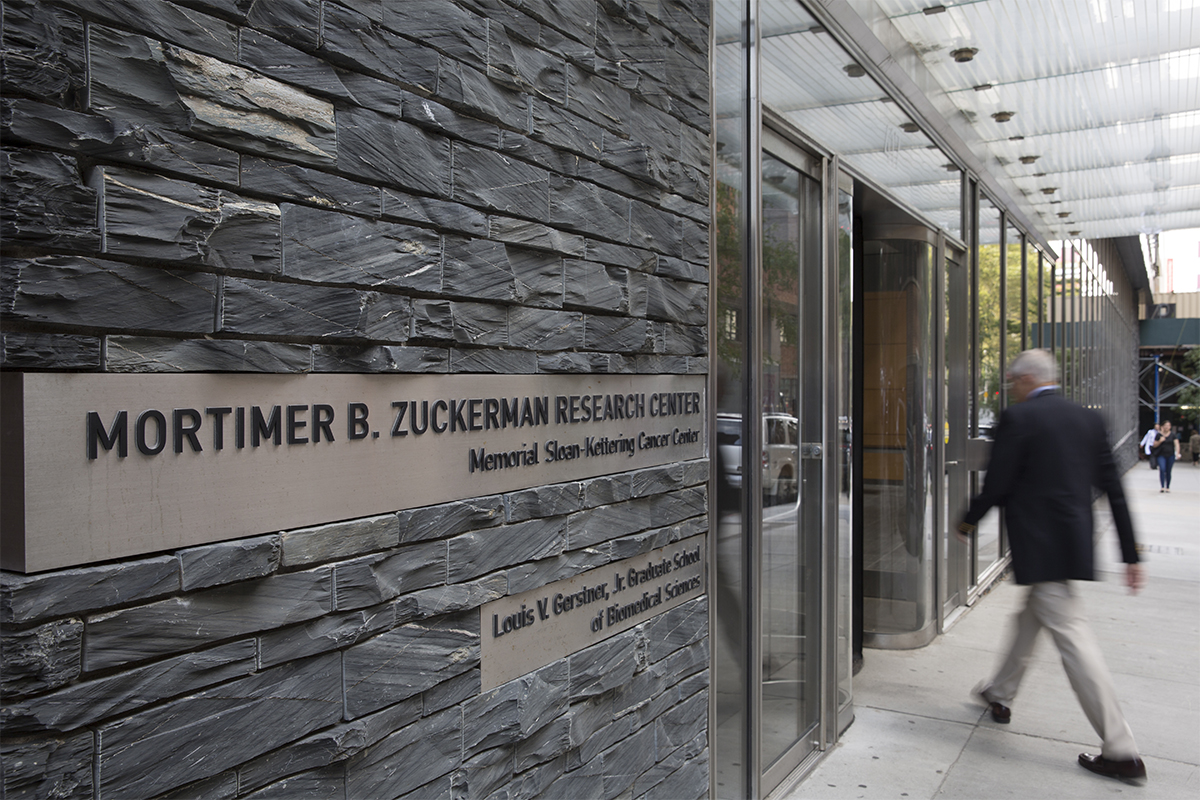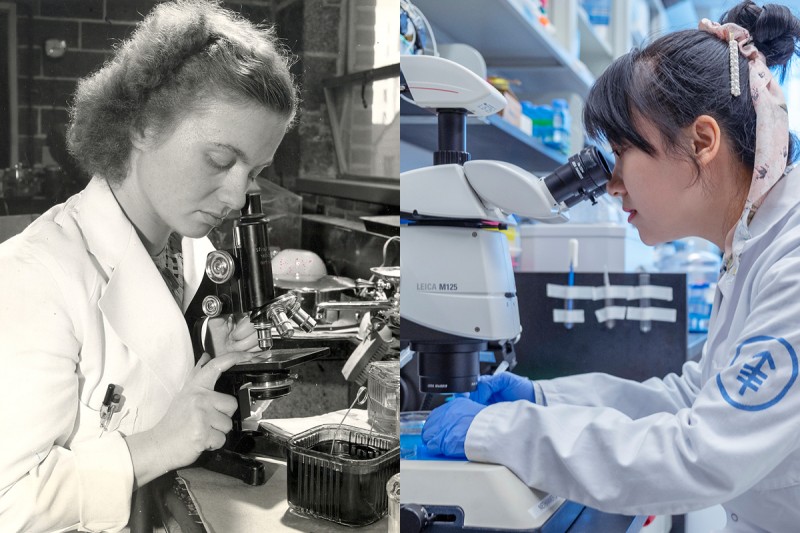
Over the last seven and a half decades, Sloan Kettering Institute researchers have made important contributions to the fundamental understanding of human biology, as well as driven practice-changing innovations in the treatment of cancer.
When the Sloan Kettering Institute opened its doors on Friday, April 16, 1948, an Associated Press wire story announced: “The world’s greatest cancer center opened here today.”
And over the last seven and a half decades, institute researchers have made important contributions to the fundamental understanding of human biology, as well as driven practice-changing innovations in the treatment of cancer.
Sloan Kettering Institute scientists have discovered cancer-linked genes, unraveled signaling pathways that control cell growth and division, and identified cells involved in mounting and repressing immune responses.
They’ve illuminated how vesicles transport molecules to the surface of cells for secretion — work that later went on to earn a Nobel Prize. They’ve figured out how to derive dopamine-producing neurons from human embryonic stem cells, setting the stage for new treatments for Parkinson’s disease. And they’ve uncovered an overlooked alternative to the famous Krebs cycle, the main process that supplies the energy needs of cells — to list just a few examples.
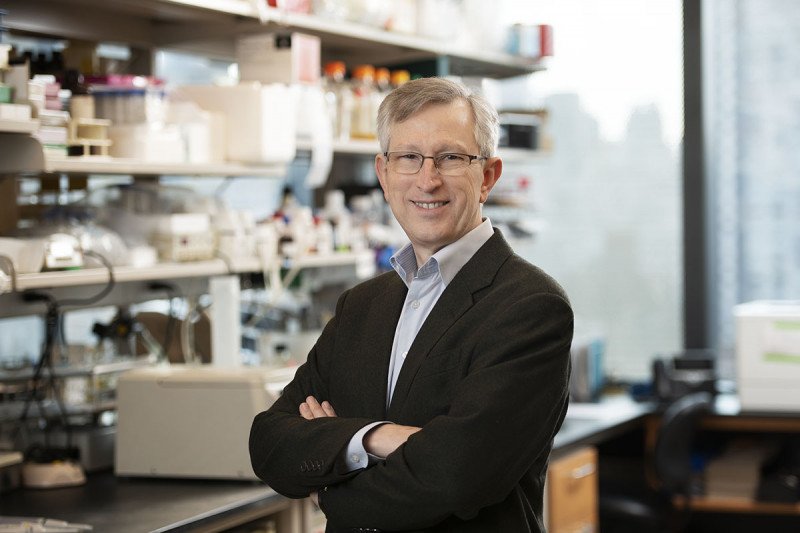
Sloan Kettering Institute Director Joan Massagué
And they’ve helped pioneer major advances in cancer treatment, from developing some of the first effective chemotherapy drugs to making significant contributions to today’s cutting-edge immunotherapies.
“Even with the many milestones in fundamental biology and cancer research that have happened here, there’s good reason to believe our most important contributions are yet to come,” says Sloan Kettering Institute Director Joan Massagué, PhD, a leading researcher on cancer metastasis and Chief Scientific Officer of Memorial Sloan Kettering Cancer Center (MSK). “That’s true not just for the research being done within the walls of the institute, but also for the many young scientists who receive their training here and go on to do profound, influential work around the globe.”
‘A Premier Research Institute and a Premier Cancer Hospital’
For years, the institute has been a hub for biological research within the larger cancer center. It has always fostered a mix of “basic science” — research that aims to expand human knowledge about fundamental biological processes — and “translational science,” which turns discoveries into new treatments and diagnostic tools.
Today the Sloan Kettering Institute is well known within the scientific community, with members frequently publishing their discoveries in leading scientific journals and appearing on lists of the most highly cited researchers. Those who have called the institute home have been recognized with many of science’s most prestigious honors: the Nobel Prize, the Lasker Award, the Shaw Prize, and selection as Howard Hughes Medical Institute investigators.
“There are great research institutes dedicated to answering foundational questions in human biology and translating those findings into new strategies against disease. And there are great academic medical centers that provide excellent patient care and that conduct clinical trials for cutting-edge treatments,” says Selwyn M. Vickers, MD, FACS, the President and CEO of Memorial Sloan Kettering Cancer Center. “What makes MSK special is the unique interlinking of the two along a common mission — ending cancer for life — in that MSK includes a premier research institute and a premier cancer hospital.”
The institute’s creation was first announced by philanthropist Alfred P. Sloan and inventor Charles F. Kettering in August of 1945.
At the time, Mr. Sloan was chairman of General Motors and a trustee on the board of Memorial Hospital, and Dr. Kettering was vice president and director of research at General Motors. Mr. Sloan donated $4 million to launch the institute through his Alfred P. Sloan Foundation, and Dr. Kettering served as a member of the institute’s Committee on Scientific Policy.
When it was originally created, the Sloan Kettering Institute was a separate entity from Memorial Hospital, with its own management and its own board. The two formally united in 1980.
A Commitment to Basic Science
The Sloan Kettering Institute has been defined by its steadfast commitment to basic science and preclinical research.
“What makes us unique is that we’re in a cancer center, even though there’s not a mandate for researchers here to work directly on cancer,” says Anna-Katerina “Kat” Hadjantonakis, PhD, who chairs the Developmental Biology Program and whose lab studies how cells regulate their identity. “I always tell trainees, ‘If you come here, there’s no experiment that’s off limits.’”
The size of the institute — with about 100 small-to-medium sized labs spanning a diversity of fields from cancer genetics to immunology to molecular pharmacology — lends itself to the type of serendipitous and synergetic interactions that can be harder to come by in a larger, academic setting, she notes.
Tobias Walther, PhD, Chair of the Cell Biology Program, points to MSK’s “unparalleled” support for the research enterprise as a reason he relocated the lab he jointly runs with Robert Farese, Jr., MD, from Harvard to the Sloan Kettering Institute in the fall of 2022.
This support includes the state-of-the-art core facilities that support member labs, from nuclear magnetic resonance spectroscopy to structural biology, from bioinformatics to DNA sequencing. These core labs are staffed by experts who partner with investigators’ labs to perform experiments and assays that are often technically complex and require sophisticated instrumentation.
“And all of this happens within the larger ecosystem of scientific and educational excellence across the tri-institutional partnership between MSK, The Rockefeller University, and Weill Cornell,” Walther adds.
Training the Next Generation of Scientists
Michael Overholtzer, PhD, also stresses the educational aspects of the environment.
“I’ve seen firsthand how amazing the Tri-I is — the unparalleled education and research collaboration between these three world-class institutions — and,
to me, that makes this the best place in the world to do science, particularly biomedical science,” says Dr. Overholtzer, who leads a cell biology lab and serves as Dean of the Gerstner Sloan Kettering Graduate School of Biomedical Science.
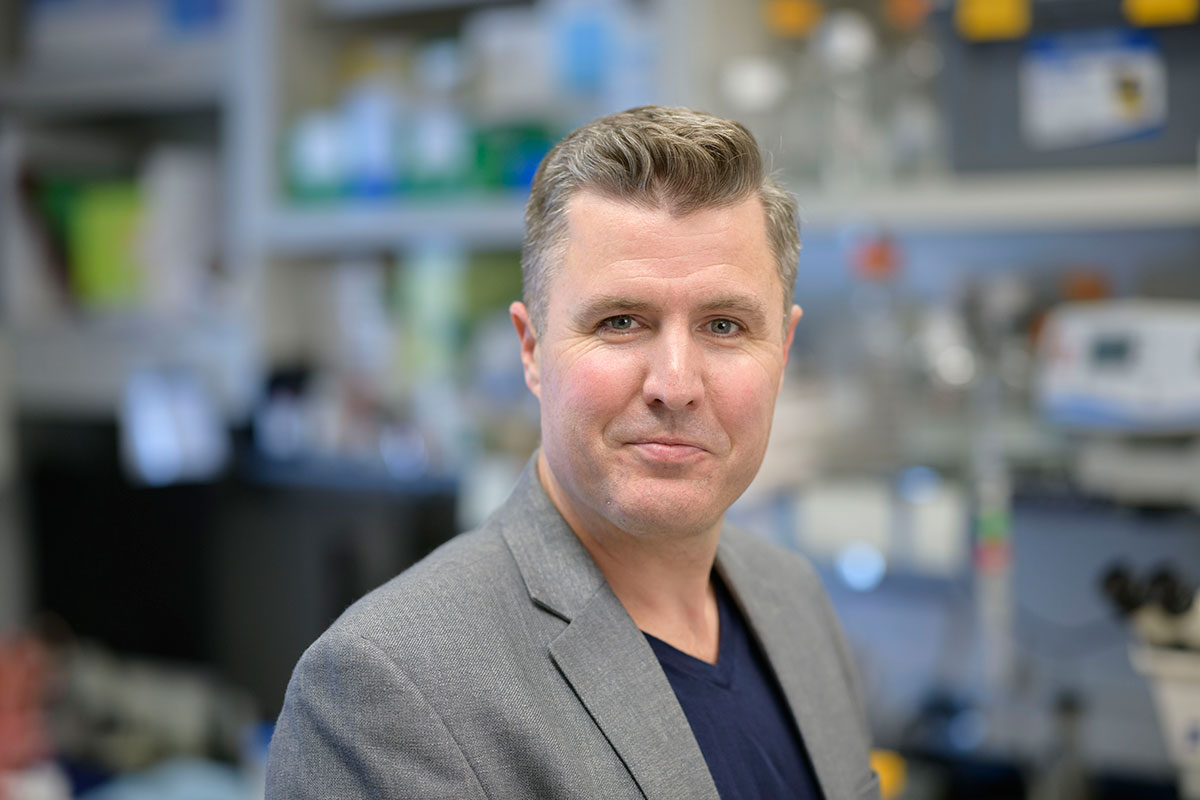
Gerstner Sloan Kettering Gradaute School Dean Michael Overholtzer
Yet it wasn’t until Dr. Overholtzer started to run his own lab that he fully appreciated the importance of investigators’ roles as educators.
“There’s so much training to become a scientist that you spend years focusing on your own development in research,” he says. “Starting my independent lab showed me how much more rewarding it can be to provide that little spark to help someone else on their path to discovery. I feel so privileged to work with our exceptional up-and-coming scientists, and to participate in some small way in their development is a thrill of my career.”
The Gerstner Sloan Kettering graduate school has matriculated more than 200 students since its first class entered in 2006, offering a curriculum that bridges laboratory work with opportunities to learn about the clinical side of cancer. And with only 10 to 15 new students accepted per year, Dr. Overholtzer has the opportunity to get to know each of them.
Innovation on the educational front continues, too. The graduate school is in the process of launching a new doctoral program in cancer engineering — an acknowledgment of the increasing role that technology and biomedical engineering are playing in the field.
“We really want to attract students with amazing minds for engineering who want to come here and help us to end cancer,” Dr. Overholtzer says.
From the Bench to the Bedside
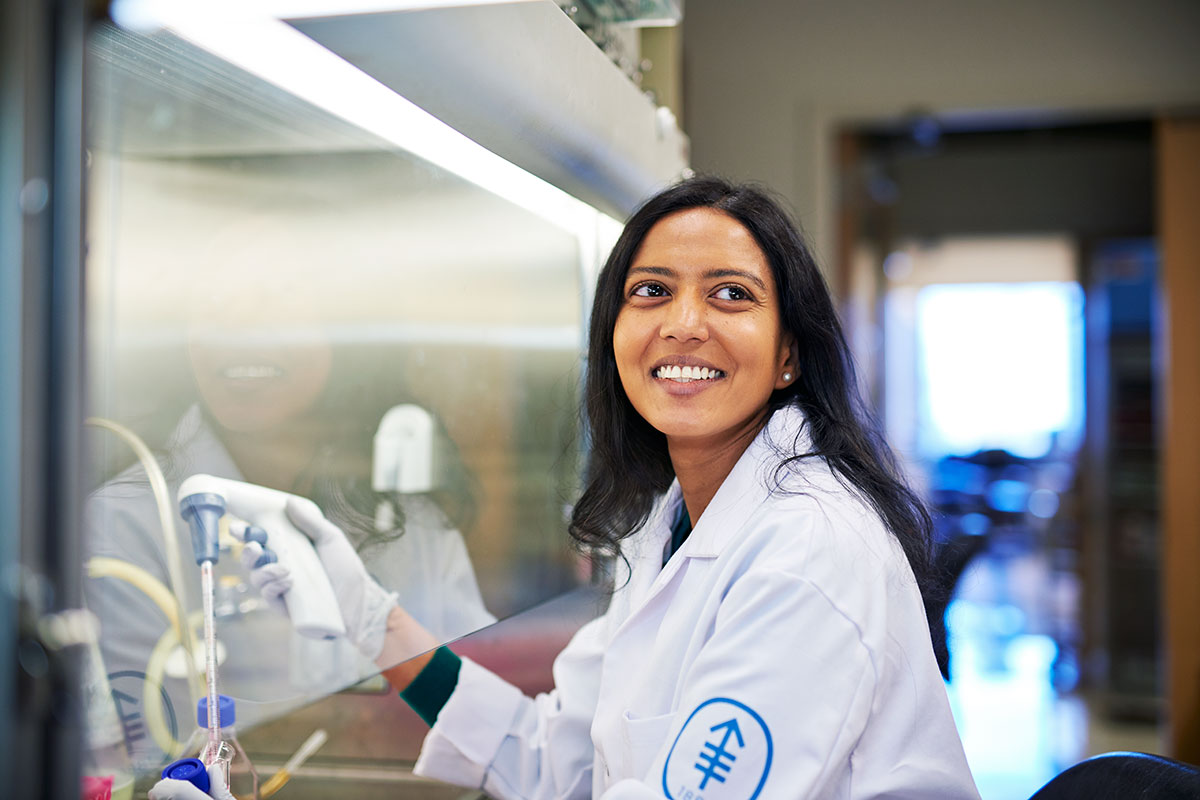
Physician-scientist Karuna Ganesh
Meanwhile, Karuna Ganesh, MD, PhD, has seen the institute from multiple perspectives, first as a postdoc working in the lab of Dr. Massagué, and later as a physician-scientist running her own lab while caring for patients with gastrointestinal cancers.
She describes the Sloan Kettering Institute as a place that’s able to transcend some of the typical boundaries and blind spots of the largely separate worlds of basic science and clinical care.
“There are some places where the emphasis on basic science and curiosity-driven inquiry is so focused, there’s almost an antipathy for the practical or the clinically relevant,” she says. “And on the other side, in the clinical space, there’s the investment in what’s going to change the life of a patient today — but where it’s easy to lose sight of where many of our life-altering discoveries come from: a fundamental understanding of biology and nature and physics. At the Sloan Kettering Institute, there really is the mindset that you can do both.”
In her lab, for example, tumor samples donated by patients treated on the clinical side of MSK are grown into three-dimensional mini-tumors called organoids, which are then used to study the challenging problem of metastasis — the ability of some cells to resist therapy and spread cancer throughout the body.
“This is a place where basic scientists and clinicians join forces all the time,” says Scott Lowe, PhD, Chair of the Cancer Biology and Genetics Program. “I feel fortunate to be working with people who think very deeply about different aspects of cancer and cancer therapy, and who are extremely helpful in sharing their expertise and knowledge. It’s equally rewarding that my lab is able to help researchers here answer important questions by sharing our expertise and the technologies we’ve developed.”
The institute also benefits from strong philanthropic support that has funded initiatives like the Marie-Josée and Henry R. Kravis Cancer Ecosystems Project, Dr. Ganesh adds. The project is supporting a new frontier in research, studying cancer not just as mutant genes in the context of cancer genomes, but also as malignant cells in the context of the entire body.
“This means we’re able to take more risks and investigate more complex problems that others might not because they’re focused on the more conventional projects that will have a higher chance of being funded by traditional sources, like federal grants,” she says.
Looking Toward the Next 75 Years
As the first Chief Scientific Officer for all of MSK, Dr. Massagué is already working with a broad group of scientific leaders from across the organization to find new opportunities, synergies and efficiencies throughout MSK’s basic and translational research enterprise — which includes labs, programs and technology resources beyond the four corners of the Sloan Kettering Institute.
These new efforts include additional direct support for basic science, strategic investments in new technologies and computational resources, and faster ways to bring discoveries from the lab into the patient setting through MSK-led clinical trials.
“I’ve had the privilege of being an investigator and administrator at the Sloan Kettering Institute for more than 30 years — not quite half of its existence — and I’ve never been more excited about our future than I am today,” Dr. Massagué says. “As we look toward the next 75 years, the institution’s support for preclinical research, its connection with outstanding clinical investigation at Memorial Hospital, the caliber of our faculty and trainees, and the spirit of multidisciplinary collaboration have never been better.”
